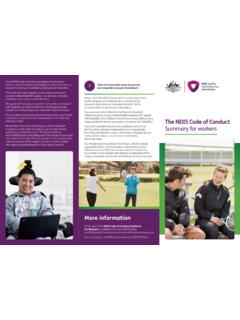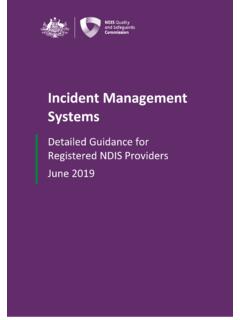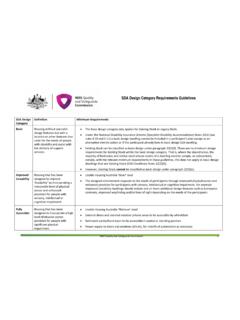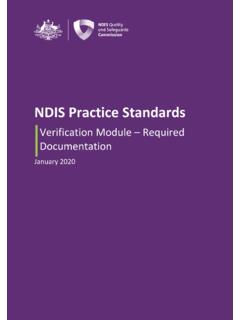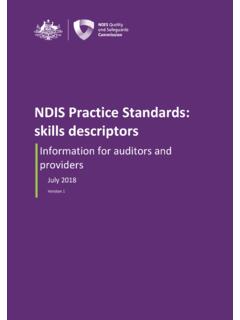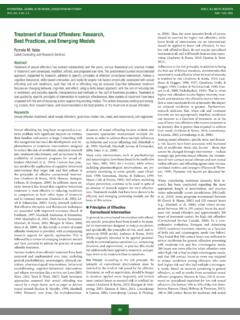Transcription of NDIS Practice Standards and Quality Indicators
1 NDIS Practice Standards and Quality Indicators November 2021 Version 4 NDIS Quality and Safeguards Commission 1 Contents What are the NDIS Practice Standards ? .. 4 Core Module .. 5 1. Rights and Responsibilities .. 5 Person centred 5 Individual values and beliefs .. 5 Privacy and Dignity .. 5 Independence and informed choice .. 6 Violence, Abuse, Neglect, Exploitation and Discrimination .. 6 2. Provider Governance and Operational Management .. 7 Governance and Operational Management .. 7 Risk Management .. 7 Quality Management .. 8 Information Management .. 9 Feedback and Complaints Management .. 9 Incident Management .. 10 Human Resource Management .. 10 Continuity of Supports .. 11 Emergency and Disaster Management .. 11 3. Provision of Supports .. 12 Access to supports .. 12 Support Planning .. 13 Service Agreements with Participants .. 14 Responsive Support Provision.
2 14 Transitions to or from a provider .. 15 4. Provision of Supports Environment .. 15 Safe environment .. 15 Participant Money and Property .. 16 Management of Medication .. 17 Mealtime Management .. 17 Management of Waste .. 18 High Intensity Daily Personal Activities Module .. 19 Complex Bowel Care .. 19 Enteral (Naso-Gastric Tube Jejunum or Duodenum) Feeding and Management .. 19 NDIS Quality and Safeguards Commission 2 Tracheostomy Management .. 20 Urinary Catheter Management (In-dwelling Urinary Catheter, In-out Catheter, Suprapubic Catheter) .. 21 Ventilator Management .. 21 Subcutaneous Injections .. 22 Complex Wound Management .. 22 Specialist Behaviour Support Module .. 23 Behaviour Support in the NDIS .. 23 Restrictive Practices .. 23 Functional Behaviour Assessments and Behaviour Support Plans .. 24 Supporting the Implementation of the Behaviour Support Plan .. 25 Reportable Incidents involving the Use of a Restrictive Practice .
3 26 Interim Behaviour Support Plans .. 26 Implementing Behaviour Support Plans Module .. 27 Behaviour Support in the NDIS .. 27 Regulated Restrictive Practices .. 27 Supporting the Assessment and Development of Behaviour Support Plans .. 28 Behaviour Support Plan Implementation .. 28 Monitoring and Reporting the Use of Regulated Restrictive Practices .. 29 Behaviour Support Plan Review .. 29 Reportable Incidents involving the Use of a Restrictive Practice .. 29 Interim Behaviour Support Plans .. 30 Early Childhood Supports Module .. 31 The Child .. 31 The Family .. 31 Inclusion .. 32 Collaboration .. 32 Capacity Building .. 33 Evidence Informed Practice .. 33 Outcome based approach .. 33 Specialist Support Co-ordination 35 Specialised Support Co-ordination .. 35 Management of a Participant s NDIS Supports .. 36 Conflict of interest .. 36 NDIS Quality and Safeguards Commission 3 Specialist Disability Accommodation Module.
4 36 Rights and Responsibilities .. 36 Conflict of Interest .. 37 Service Agreements with Participants .. 38 Enrolment of SDA Properties .. 39 Tenancy Management .. 39 Verification Module .. 41 Human Resource Management .. 41 Incident Management .. 41 Complaints Management .. 42 Risk Management .. 42 Definitions .. 43 NDIS Quality and Safeguards Commission 4 What are the NDIS Practice Standards ? The NDIS Practice Standards create an important benchmark for providers to assess their performance, and to demonstrate how they provide high Quality and safe supports and services to NDIS participants. Together with the NDIS Code of Conduct, the NDIS Practice Standards will assist NDIS participants to be aware of what Quality service provision they should expect from NDIS providers. The outcomes of the NDIS Practice Standards are included within the National Disability Insurance Scheme (Provider Registration and Practice Standards ) Rules 2018.
5 The National Disability Insurance Scheme ( Quality Indicators ) Guidelines 2018 list the outcomes of the NDIS Practice Standards and also the associated Quality Indicators NDIS providers can use to demonstrate conformity with the outcomes. The NDIS Practice Standards consist of a core module and several supplementary modules that apply according to the types of supports and services NDIS providers deliver. The Core module covers: rights and responsibility for participants governance and operational management the provision of supports, and the support provision environment The supplementary modules cover: High intensity daily personal activities Specialist behaviour support Implementing behaviour support plans Early childhood supports Specialised support co-ordination, and Specialist disability accommodation. Each module has: a series of high-level, participant-focused outcomes, and for each outcome, Quality Indicators that auditors will use to assess a provider s compliance with the Practice Standards NDIS Quality and Safeguards Commission 5 Core Module 1.
6 Rights and Responsibilities These NDIS Practice Standards set out the rights of participants and the responsibilities of providers that deliver supports and services to them. Person centred supports Outcome: Each participant accesses supports that promote, uphold and respect their legal and human rights and is enabled to exercise informed choice and control. The provision of supports promotes, upholds and respects individual rights to freedom of expression, self-determination and decision-making. To achieve this outcome, the following Indicators should be demonstrated: Each participant s legal and human rights are understood and incorporated into everyday Practice . Communication with each participant about the provision of supports is responsive to their needs and is provided in the language, mode of communication and terms that the participant is most likely to understand. Each participant is supported to engage with their support network and chosen community as directed by the participant.
7 Individual values and beliefs Outcome: Each participant accesses supports that respect their culture, diversity, values and beliefs. To achieve this outcome, the following Indicators should be demonstrated: At the direction of the participant, the culture, diversity, values and beliefs of that participant are identified and sensitively responded to. Each participant s right to Practice their culture, values and beliefs while accessing supports is supported. Privacy and Dignity Outcome: Each participant accesses supports that respect and protect their dignity and right to privacy. To achieve this outcome, the following Indicators should be demonstrated: Consistent processes and practices are in place that respect and protect the personal privacy and dignity of each participant. Each participant is advised of confidentiality policies using the language, mode of communication and terms that the participant is most likely to understand.
8 NDIS Quality and Safeguards Commission 6 Each participant understands and agrees to what personal information will be collected and why, including recorded material in audio and/or visual format. Independence and informed choice Outcome: Each participant is supported by the provider to make informed choices, exercise control and maximise their independence relating to the supports provided. To achieve this outcome, the following Indicators should be demonstrated: Active decision-making and individual choice is supported for each participant including the timely provision of information using the language, mode of communication and terms that the participant is most likely to understand. Each participant s right to the dignity of risk in decision-making is supported. When needed, each participant is supported to make informed choices about the benefits and risks of the options under consideration.
9 Each participant s autonomy is respected, including their right to intimacy and sexual expression. Each participant has sufficient time to consider and review their options and seek advice if required, at any stage of support provision, including assessment, planning, provision, review and exit. Each participant s right to access an advocate (including an independent advocate) of their choosing is supported, as is their right to have the advocate present. Violence, Abuse, Neglect, Exploitation and Discrimination Outcome: Each participant accesses supports free from violence, abuse, neglect, exploitation or discrimination. To achieve this outcome, the following Indicators should be demonstrated: Policies, procedures and practices are in place which actively prevent violence, abuse, neglect, exploitation or discrimination. Each participant is provided with information about the use of an advocate (including an independent advocate) and access to an advocate is facilitated where allegations of violence, abuse, neglect, exploitation or discrimination have been made.
10 Allegations and incidents of violence, abuse, neglect, exploitation or discrimination, are acted upon, each participant affected is supported and assisted, records are made of any details and outcomes of reviews and investigations (where applicable) and action is taken to prevent similar incidents occurring again. NDIS Quality and Safeguards Commission 7 2. Provider Governance and Operational Management These NDIS Practice Standards set out the governance and operational management responsibilities for NDIS Providers. Governance and Operational Management Outcome: Each participant s support is overseen by robust governance and operational management systems relevant (proportionate) to the size, and scale of the provider and the scope and complexity of supports delivered. To achieve this outcome, the following Indicators should be demonstrated: Opportunities are provided by the governing body for people with disability to contribute to the governance of the organisation and have input into the development of organisational policy and processes relevant to the provision of supports and the protection of participant rights.

